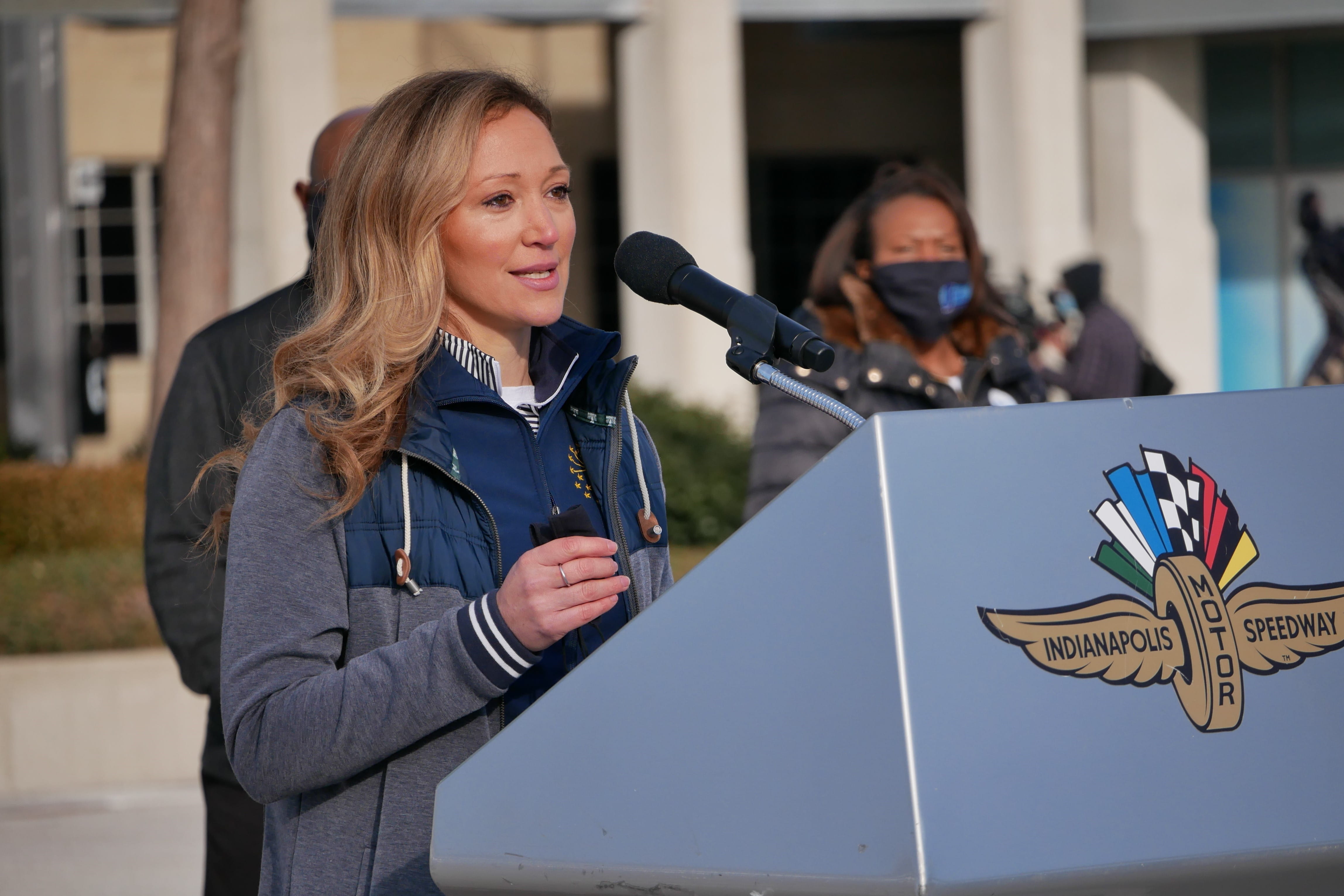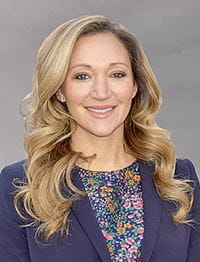A prescription for improving the state's health

Laura Gates May 29, 2024
MAYBE IT WAS the influence of “General Hospital,” her mother’s favorite daytime drama, but from her earliest memories, Lindsay Weaver, MD, said being a doctor was “just what I wanted to do.”
Today, Weaver is state health commissioner — Indiana’s top doctor —while also serving as an adjunct assistant professor of emergency medicine at Indiana University School of Medicine and an emergency medicine physician with IU Health. She can still be found orchestrating the chaos that comes into the emergency center at Methodist Hospital in Indianapolis nearly every Tuesday.
“You get to meet people from every different walk of life and take care of them on what, often, is their worst day,” Weaver said.
Whether she’s facing a grisly gunshot wound or a global pandemic, Weaver keeps calm as she manages crises. In the emergency room, everything is fast-paced — quick decisions lead to immediate improvement — while at the health department, decisions are based on years of data and take considerable time to register results.
“I love taking care of the patient in front of me, but public health is an opportunity for bigger impact,” Weaver said.
Creating healthier communities

Weaver became health commissioner in June 2023. Before that, she served as the chief medical officer for the Indiana Department of Health — a position she started in March 2020, just as the World Health Organization declared COVID-19 a pandemic.
“Had I known, I still would’ve done it,” said Weaver, a mother of five who coordinated Indiana’s lab testing network and led the statewide rollout of vaccines. “I would’ve hated being home and feeling helpless. Instead, I was in a position to take action and do things every single day.”
Now Weaver is leading the Health First Indiana initiative, a $225 million commitment from the state to create healthier communities and improve Indiana’s dismal rankings on key public health metrics, including tobacco use, obesity, drug overdose deaths and child and infant mortality.
When he announced it in 2023, Indiana Gov. Eric Holcomb called the initiative a “1500% increased state investment” in public health that would be “a game-changer for Hoosiers.”
As part of the rollout, Weaver is conducting a tour of Indiana counties that she plans to complete this summer.
“We’re having conversations, and the hospitals are showing up, the school superintendents are showing up, the local health coalitions, businesses and foundations are showing up — everybody recognizes that this is a real opportunity,” she said. “We have a budget, and we have a plan. There’s true excitement.”
Weaver’s team worked with local health officers to develop statewide performance indicators, but communities have “100% local control” on how to spend funds, she said.
“One county with high obesity identified that half the county had no access to fresh fruits and vegetables — they were shopping at gas station convenience stores,” Weaver said. “I would have no way of knowing that from (Indianapolis).”
Health First Indiana will enable local health departments to move beyond maintaining basic services and toward creating healthier communities.
“Together and collectively, we’ll start to move the needle in areas like infant and maternal health, tobacco use prevention and cessation, and trauma and injury prevention,” Weaver said.
Inspiring women in medicine
Growing up in Villa Hills, Kentucky, a suburb of Cincinnati, Weaver developed her work ethic, starting at age 14, in a family-owned restaurant. Many of her family members, including her father, were police officers, showing her the value of public service from a young age.
She earned a bachelor’s in biology from the University of Kentucky and a medical degree from the University of Louisville. In 2008, she came to IU School of Medicine for residency training in emergency medicine. Jen Sullivan, MD, MPH, program director at the time, said she had never seen an intern so interested in health policy and advocacy.
“From the moment she began, she had a laser focus on the way clinical training could impact the big picture of health policy,” Sullivan said. “She spent her extra time learning about the intricacies of the history of physician advocacy and built the very first health policy elective for emergency medicine in the country.”
Weaver worked with former Indiana State Sen. Patricia Miller and the state’s public health committee to advocate for the Indiana POST legislation ensuring that people facing end-of-life decisions would have their treatment preferences honored. She later completed fellowships in clinical ethics and palliative care.
Sullivan said Weaver has the rare combination of being both visionary and grounded.
“She expects a great deal from her team but will roll up her sleeves and work right alongside them,” Sullivan said. “Dr. Weaver is an incredible role model for women leaders and women in medicine.”
Before joining the health department, Weaver was the youngest female president of the Indiana chapter of the American College of Emergency Physicians. For her role in managing the state’s pandemic response, Weaver was named to the Indiana Business Journal’s “Forty Under 40” in 2021, as well as IBJ’s 2023 Women of Influence.
While Weaver strategized for the state during the pandemic, her husband, Chris Weaver, MD — also an emergency medicine professor and physician — led from the trenches of local hospitals as senior vice president of clinical effectiveness for IU Health.
“Our kids got sick of spaghetti,” Weaver joked. For a brief time, they stayed with their grandparents in Kentucky to establish a routine for remote schooling.

Weaver hopes her daughters, ages 6 to 18, are inspired to be helpers and unapologetically go after their passions — no matter what career paths they choose. Her eldest plans to enter the pre-med track at Kentucky this fall, and her kindergartner says she wants to be a “mommy doctor.”
Considering her mother’s childhood resolve, there’s a good chance that will stick.
Fourth-year medical student Adaline Heitz gained several insights from shadowing Weaver during an elective rotation at the Department of Health.
“One of my largest takeaways from the rotation is that there is seldom a one-size-fits-all solution to any public health issue, and the entities and individuals best equipped to identify problems and inform solutions are oftentimes those that are part of the communities themselves,” said Heitz, who has a Master of Science in Public Health.
In addition to her time with Weaver, Heitz rotated with a local health officer in Clark County, Indiana, and gained global health experiences through the IU School of Medicine AMPATH program in Kenya. She aims to become a primary care physician who is also a strong advocate.
“One impactful piece of wisdom that Dr. Weaver gave me was that there are many ways to engage in advocacy, and each of these comes with different platforms, responsibilities and limitations,” Heitz said. “She gave me fantastic insight into what makes a good leader, how to be an advocate, how to tailor communication to your audience, and the importance of uplifting the voices of stakeholders.”
Whether she’s treating someone in the ER or talking policy with lawmakers, Weaver operates in the wisdom of researcher-writer Brené Brown: “People, people, people are just people, people, people.”
“My hope and dream for this year is better utilizing data and getting it out in the hands of physicians and the community so they can make data-driven decisions and take action immediately,” Weaver said. “The numbers are never just numbers — they are always real people.”
Laura Gates
Laura is a senior writer with the Office of Strategic Communications. A native Hoosier, she has 25 years of experience in communications, having worked with newspapers and other media organizations in Indiana and Florida, along with small businesses, community groups and non-profit organizations. Before joining IU School of Medicine in January 2020, she was editor-in-chief of a lifestyle magazine serving the community of Estero, Florida.